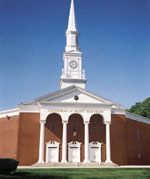
 |
|
|
|
|
|
|
|
 |
Collects and PrayersPraying can be done in many different ways. Prayer can be made in silence, with actions, or with words. Churches typically choose to use words in two ways. Some pray extemporaneously, choosing words that occur in the moment. Most praying in an Episcopal service is characterized by prescribed, written prayers read from The Book of Common Prayer.Each kind of praying has an important place. When we pray extemporaneously we value the way in which our prayer is able to address the circumstances of the moment. A written prayer has its own value and is an important part of corporate worship. First, everyone can say the prayer together, which serves to heighten the sense of community. We are even conscious that these same prayers are being prayed all over the world by persons within the Anglican Communion. It is often said that our praying shapes our believing, and this is especially true of the prayers we say from the Book of Common Prayer. A third advantage of written prayers is that they express for us in beautiful words and literary phrases those thoughts and feelings we often struggle to say. When we say the lovely Ash Wednesday prayer written by Thomas Cranmer in 1549, we join our voices to those of almost five hundred years of praying Christians. As the service begins, we hear the priest say The Collect for Purity: "...to you all hearts are open, all desires known, and from you no secrets are hid." A collect is a particular kind of written prayer. It is structured in three parts: it addresses God, it asks for something from God, and it closes with naming Jesus and describing God's glory (a doxology). Although the word is pronounced collect, it does actually mean to collect, or to sum up the prayers of all the worshipers. As you hear the opening words of the Collect for Purity, quiet yourself inwardly and focus your thoughts on becoming ready for what is to come. In this moment one can travel from outer movements of the procession and the music to an inner stillness of the inmost heart. |

Our Patient Merciful God
The Bible and the Gospel speak of God's great mercy for us ...
(Click title to read more)

|
|
| Home | Cathedral History | Seed Faith Principle | Explain Seed Faith | Developing Strong Faith | Prayer Request Letters | Teaching Prayer | | Faith Contact Item | Prayer Rug | Seed Faith Growth | Kneeling in Worship | Site Map |
“Enter his gates with
thanksgiving and his courts with praise; give thanks to him
and praise his name. |
||